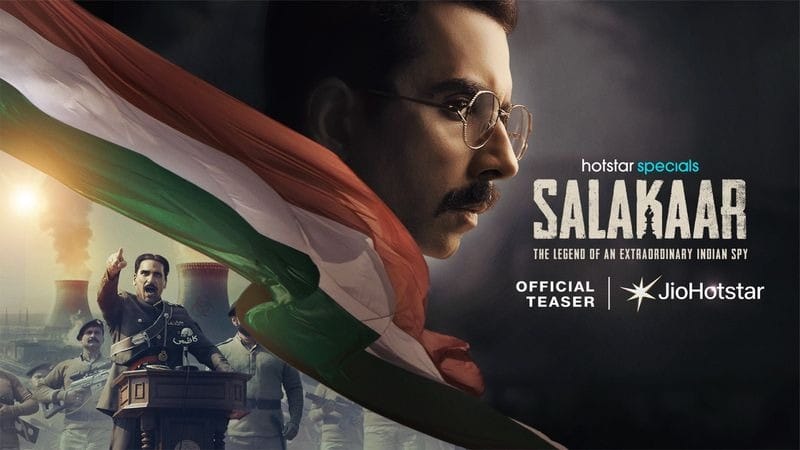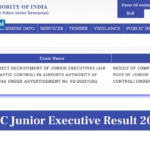Salakaar, now streaming on JioHotstar, arrives as a short five-episode limited series with a total runtime of around two and a half hours — essentially the length of a feature film chopped into segments. This format could have been a blessing, promising tight pacing and the ability to dive straight into the heart of the story without unnecessary fluff. Unfortunately, what unfolds is a series that stumbles between timelines, struggles to maintain suspense, and ends up feeling like a half-hearted homage to both Argo and the legend of Ajit Doval. Ironically, the very thing that keeps Salakaar watchable is its brevity — in a streaming space where many shows overstay their welcome, this one at least doesn’t.
Unraveling the Argo Shadow
The premise leaves no doubt about its inspiration. At the center is Adheer Dayal (played by Naveen Kasturia), a seasoned RAW officer who revisits a high-stakes mission from 1978 involving a foiled nuclear threat from Pakistan. Decades later, in 2025, echoes of that mission resurface, forcing him to confront unfinished business. Directed by Faruk Kabir, the series weaves between these two timelines, attempting to layer personal history with national security stakes.
On paper, the dual-period structure offers a wealth of storytelling possibilities — from parallel tensions to emotional callbacks. But in execution, it feels muddled. Key details are glossed over, character arcs are underdeveloped, and the narrative often relies on clumsy shortcuts rather than well-built suspense. The five-episode format feels less like a deliberate choice and more like a chopped-down film, with transitions that disrupt rather than enhance the flow.
A Tribute That Feels Like a Forwarded Message
Salakaar clearly wants to position itself as a patriotic espionage thriller. It draws on real-world inspirations and attempts to elevate them into a tense, high-stakes drama. The problem is that it often overshoots into melodrama, leaning on exaggerated heroism rather than grounded storytelling. The portrayal of Adheer Dayal feels less like a complex operative wrestling with moral ambiguity and more like a one-dimensional nationalist hero straight out of a forwarded WhatsApp video.
Argo — the film it so clearly references — thrives on balancing suspense with human vulnerability. Salakaar, by contrast, misses the subtleties. Scenes that should be tense are instead predictable. Risks that should feel life-threatening come across as conveniently resolved. Even the espionage set pieces lack the grit and realism needed to fully immerse the viewer.
Performances: The Saving Graces
If the writing falters, the cast at least tries to hold things together.
- Mouni Roy as Mariam is easily the standout. Her performance brings much-needed depth and presence to the screen. Whenever she appears, there’s a noticeable lift in engagement. She plays Mariam with a quiet strength, adding nuance to a role that could have easily been reduced to a stock supporting character.
- Naveen Kasturia as Adheer Dayal carries the series on his shoulders. He manages to convey the weariness of a man burdened by history, though the writing sometimes traps him in stoic, near-superhuman territory that undercuts his believability.
- Surya Sharma and Mukesh Rishi serve as the antagonistic forces from the Pakistani side. Both actors bring gravitas to their roles, but again, the script gives them little room to become more than archetypes. They hint at layered backstories, but the series never explores them fully.
A Structure That Works Against Itself
The decision to alternate between 1978 and 2025 could have been a narrative strength, allowing the two timelines to build toward each other. Instead, Salakaar often gets caught in its own structural traps. Flashbacks appear without enough setup, and the modern-day storyline lacks the tension needed to justify its presence. Viewers are left feeling like they’re watching two incomplete films playing in parallel.
One recurring issue is the series’ over-reliance on exposition. Instead of showing events unfold with natural pacing, much of the backstory is told through dialogue dumps or brief visual montages. This keeps the viewer at a distance from the actual stakes — we’re told what’s important instead of feeling it unfold.
Missed Opportunities
Perhaps the most frustrating aspect of Salakaar is the number of opportunities it squanders:
- The espionage realism: True spy stories often shine when they capture the tension of waiting, the uncertainty of incomplete intel, and the messy moral compromises operatives face. Here, missions are too neat, too quick, and too sanitized.
- The dual timeline pay-off: Stories like this can build suspense by revealing critical details from the past just in time to impact the present. Salakaar rarely achieves that payoff — revelations feel either rushed or anticlimactic.
- Character complexity: Adheer Dayal’s character could have explored the personal cost of decades in intelligence work — fractured relationships, moral exhaustion, and doubt. Instead, he’s presented as an unwavering patriot whose doubts barely register.
The Short Runtime: A Blessing and a Curse
In an era when streaming platforms stretch even modest plots into ten-hour marathons, Salakaar’s two-and-a-half-hour total runtime feels refreshing. There’s no filler, no unnecessary subplots dragging things down. The brevity keeps the series from becoming a slog.
But this same brevity is also its downfall. By compressing its story into such a tight package, Salakaar skips the breathing room necessary for genuine suspense and character depth. It feels like the creators had to choose between pace and richness — and pace won every time. What remains is a streamlined but shallow spy drama.
The Ajit Doval Effect
Any project inspired by a real figure like Ajit Doval carries an extra layer of expectation. Viewers familiar with his reputation anticipate both thrilling intelligence operations and a thoughtful portrayal of what it takes to protect a nation in high-risk situations. Salakaar tries to honor that legacy, but by idolizing its protagonist too much, it loses the chance to humanize him. The real intrigue of espionage often lies in the flaws and mistakes of its operatives — the decisions that could go either way. Here, those moments are glossed over in favor of constant competence.
Cinematography and Production Design
On the technical side, Salakaar has flashes of quality. Certain 1978 sequences are well-framed, with muted tones that differentiate them from the brighter, cleaner visuals of 2025. Some locations add authenticity, and a few action sequences — though brief — are competently staged.
However, the editing often undercuts the visual work. Rapid cuts between timelines sometimes disrupt immersion, and suspense-building sequences are trimmed too tightly to let tension breathe.
Final Verdict
Salakaar wants to be a gripping espionage drama in the vein of Argo, with the added patriotic weight of an Ajit Doval tribute. But despite some solid performances and its mercifully short runtime, it falls short in execution. The writing fails to balance spectacle with substance, and the structure robs the story of both coherence and emotional impact.
This isn’t to say Salakaar is unwatchable. For viewers curious about a quick, surface-level spy thriller with familiar beats, it’s a decent one-sitting watch. Mouni Roy’s performance, in particular, is worth noting. But those seeking a truly immersive, high-stakes espionage drama will likely walk away wishing the show had either committed to being a tightly written film or expanded into a fuller series with richer development.










